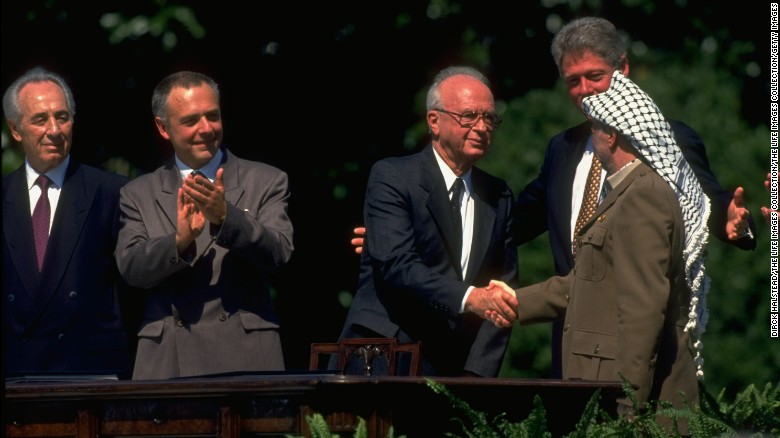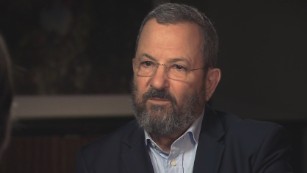Will peace be buried with Shimon Peres?
Reacting to the news that her 93-year-oldformer boss had died, former Israeli Foreign Minister Tzipi Livni raised the issue on everyone's mind: she was worried "peace would be buried with Shimon Peres."
Perhaps more than anyone in Israel, Peres was associated with that one word: peace. He had even won -- shared -- the Nobel Peace Prize with Palestinian Authority President Yasser Arafat, no less.
In the 1990s, Peres engaged in taboo-busting breakout negotiations with the Palestinians. (Actually he gave the green light to his deputy foreign minister, Yossi Beillin, who worked through Norwegian mediators.)
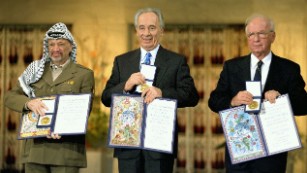
Peres receiving the Nobel Peace Prize in 1994, alongside Yitzhak Rabin and Yasser Arafat.
They brought authorized members of the Palestine Liberation Organization onside. There was a ban on face-to-face talks between the two sides; if anything was going to get done, it required an imaginative, secret, and circuitous route.
The rest, of course, is history. Peres, then foreign minister, signed the Oslo Accords on the White House lawn almost exactly 23 years ago. Remember that awkward handshake between foes -- Arafat and Israeli Prime Minister Yitzhak Rabin -- as they embarked on the long and winding road towards peace and accommodation, and a two-state solution to this most intractable of Middle East crises.
Reflecting on those heady days, and Peres' legacy, Beilin ruefully told me on Wednesday that people "were led to think that what happened was peace between Israel and Palestine, although this was not the case."
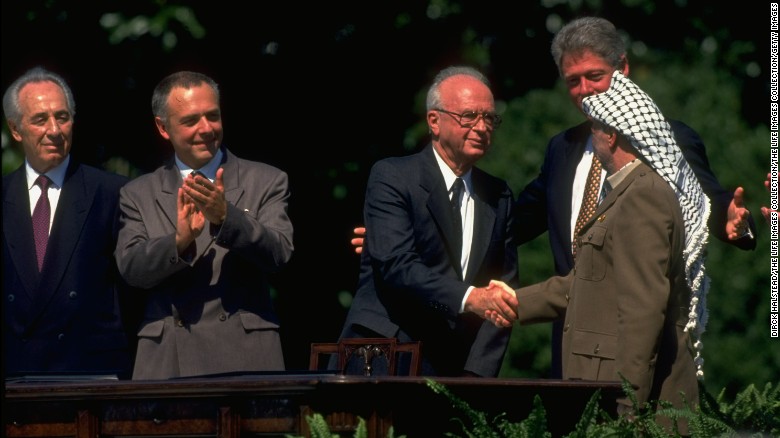
Shimon Peres (far left, then foreign minister) looks on as PLO Chairman Yasser Arafat shakes hands with Israeli Prime Minister Yitzak Rabin on the White House lawn.
"The world is not interested in details. They saw the picture of Clinton, Rabin, and Arafat and thought, 'Yes, there is peace in the Middle East.'"
Indeed, it took a second intifada in 2000 to stop Oslo dead in its tracks. Despite the lip service paid to the ideal, despite years and years of negotiations with successive American administrations mediating between Israel and the Palestinian Authority, it never recovered. And today, people are wondering whether not just Oslo, but the entire two-state solution, has been consigned to history.
Former Prime Minister Ehud Barak went further than any Israeli leader offering terms to Arafat at Camp David in 2000. He told me as late as this summer that his biggest worry was a one-state solution, which he believed would mark the end of Israel as he knew it. He blamed the current government of Benjamin Netanyahu for allowing the far-right wing of his Likud party to "hijack" the process.
Former Israeli PM: Current government has hidden 'one state' agenda
"It's [an] elected government, fully legitimate," he told me in July. "But it's a right-wing government that I believe -- I suspect -- they are interested [in] basically continuation, extrapolation of the present situation, which is a one-state, or heading toward a one-state solution, against the all the declarations pro-forma [to] the opposite.
"I think that this situation is extremely dangerous for Israel, because it will end up with one state from the Mediterranean to the River Jordan, with millions of Palestinians within it, which will make it inevitably either non-Jewish or non-democratic.
"If those Palestinians can vote to the Knesset it will become bi-national state overnight. And within a generation or so, bi-national state with Muslim majority and probably a civil war between its two different peoples. Who, if they cannot vote, that's not a democracy anymore."
Netanyahu's spokesman David Keyes denied this scenario, telling me: "You can't negotiate with yourself. ... The problem is that the other side says no."
As for Peres, my interviews with him through the years make for fascinating reading. He served two terms as prime minister - although he was never directly elected to the post, assuming it both times after procedural moves in Israel's famously complex political system.
After Ariel Sharon's victory in 2001, he told me that "what Sharon is suggesting is a peace without the Arabs. I cannot see how can you achieve it."
Shimon Peres in February 2001. https://t.co/jkusQ3AOxI
— Christiane Amanpour (@camanpour) September 29, 2016
In 2006, in a special I hosted entitled "In God's Name," he said "our problem are not differences, but differences that are being supported or used with arms, with death, and killing."
"That's the greatest problem. I do hope that in the not-far-away future we shall find a new approach with the Palestinians. We should not give up.
"Our enemies are not Muslims, are not Christians, are not Arabs, are not Palestinians. The enemies of all of us is the use of terror."
Shimon Peres in September 2006. https://t.co/Mj4WzwHXIp
— Christiane Amanpour (@camanpour) September 29, 2016
Peres never gave up hope. In 2008, when he was president -- with his old sparring partner Yasser Arafat now dead, and efforts to secure peace still struggling along in fits and starts -- he told me that he had come to believe in the importance of hearing and understanding the story of the other.
"Some of the gaps are not really physical or territorial, but emotional. Jerusalem is more of a fire than of a land. It's very sensitive. And you need some imagination [in] how to approach it."
"You know, emotions matter a great deal. [If] Sadat [had not] come to Jerusalem, I think we would never have peace with Egypt" -- referring to Egyptian President Anwar Sadat's historic 1977 visit to Jerusalem and 1978-79 Camp David Accords, mediated by American President Jimmy Carter.
"It was the emotional part more than anything else."
Shimon Peres in September 2008. https://t.co/0zIk6bLLQw
— Christiane Amanpour (@camanpour) September 29, 2016
Later that same year, after the election of Barack Obama, I would speak with him again.
"I think that the Arab countries feel that if Israel will conclude the peace with the Palestinians, that is a good enough reason to make it overall and not just limited to the Palestinian issue."
Shimon Peres in November 2008. https://t.co/jhx1xIsZRC
— Christiane Amanpour (@camanpour) September 29, 2016
But it was not to be. Both sides are locked in their unyielding paradigms.
As Former PA Minister Ghassan al Khatib told me after Peres died, he may have become a man of peace but he was also there helping direct the most controversial of Israeli policies.
Peres and Prime Minister Yiztak Rabin, Khatib said, "refused to stop the illegal expansion of Jewish settlements in the Palestinian-occupied territories, which contributed significantly to breaking the confidence between the two sides."
"There was an opportunity that he did not seize."
Continued settlement building is a red line for the Palestinians, and the international community. Terror and security is Israel's redline, also shared by its international partners. Bridging that gap seems further away than ever, as a reluctant Likud government faces off against the Palestinians and an ascendant Hamas phenomenon.
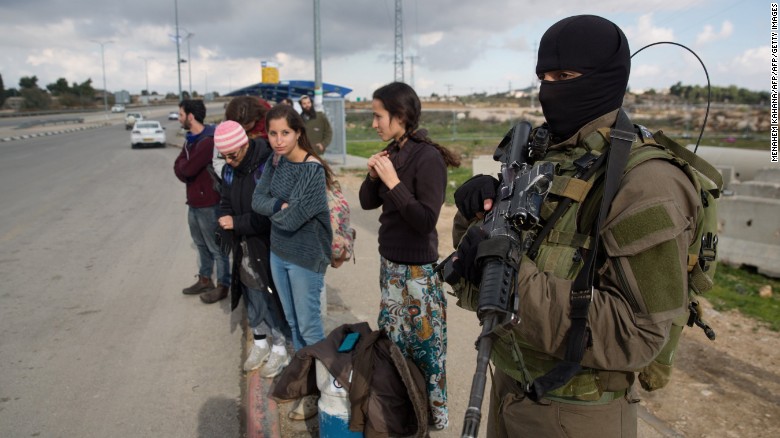
An Israeli soldier stands guard as Israeli settlers stand at a bus station in the West Bank.
Here again, Ehud Barak on what the majority of Israel's defense intelligence and security establishment is telling Netanyahu:
"They're telling not just the prime minister. They're telling the whole public, they're telling the government. All these elements, institutions, which care about Israel, they proposed to the government several times, find a way to reduce tensions with the Palestinian Authority. They are part of the solution. The Hamas is part the problem. They are part of the solution.
"Rather than having a one state from the Mediterranean to the River [Jordan], which inevitably includes millions of Palestinians who are held against their personal and national aspirations."
As for Shimon Peres, during our last interview, when he was awarded America's highest civilian honor, the Presidential Medal of Freedom, this is what he told me:
"In my judgment, Jewish people weren't born to rule another people."
"It stands against everything that we stand against. And we must keep our moral foundation. I cannot imagine a Jewish people without a moral foundation."
Shimon Peres in June 2012. https://t.co/YXNwF65Faw
— Christiane Amanpour (@camanpour) September 29, 2016
And a year later, Tzipi Livni, would lead the Netanyahu government peace negotiations with the Americans and the Palestinians; writing in the New York Times after Peres' death, she recalled a poignant press conference in Washington.
"...at the opening of the last round of peace negotiations, three of us — the United States secretary of state, John Kerry, the Palestinian chief negotiator Saeb Erekat, and I, then Israel's justice minister — stood together at a news conference in Washington. I concluded my remarks by saying that "history is not made by cynics. It is made by realists unafraid to dream.'"
"I didn't think of Shimon Peres then," Livni wrote, "but it was my first thought when he died.
And the rest of us are left asking: Can the two-state solution stay alive?
News Courtesy: www.cnn.com

